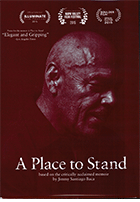
A Place to Stand 2016
Distributed by The Video Project, 145 - 9th St., Suite 102, San Francisco, CA 94103; 800-475-2638
Produced by Gabriel Baca and Daniel Glick
Directed by Daniel Glick
DVD, color, 83 min.
College - General Adult
Correctional Institutions, Corrections, Criminal Justice, Poetry, Prisons, Prison Reform, Prisoners, Psychology, Rehabilitation, Sociology, Writing
Date Entered: 01/13/2017
Reviewed by Douglas Reed, Department of Political Science, Ouachita Baptist University, Arkadelphia, ARNoted author Jimmy Santiago Baca found his poetic voice in the most unlikely of places – prison.
Based on Baca’s critically acclaimed memoir of the same title, A Place to Stand is an insightful and inspiring examination of Baca’s transformation from near-illiterate convict to celebrated poet. Baca, his family, and former inmates recount his arduous journey, a path marked by abuse, abandonment, and despair. After a short time in an orphanage, Baca ran away and took to the streets. His life of petty crime and drug dealing landed him in the Arizona State Prison. When the brutality and isolation of prison was too much to bear, Baca tapped memories of his grandfather, transporting him back to one of the few times he felt loved. These recollections and the encouragement of a man who corresponded with Baca ignited his desire to read and write. From Baca’s pen flowed verses that demonstrate his keen understanding of human nature.
Against a backdrop of contrasting gray and color images, A Place to Stand effectively captures the bleak world of solitary confinement and reflects a glimmer of hope that lies beyond prison walls. Baca’s own narration adds impact to the film’s visual appeal, especially when he recites excerpts from his poetry.
A Place to Stand is a moving testament to the power of words, words that can heal the deepest hurt and unleash incredible creativity.
Highly recommended for academic and public libraries, A Place to Stand is an outstanding resource for a variety of courses – criminal justice, education, literature, psychology, and sociology. Supporting materials include an in-depth curriculum guide and a student workbook. A related teaching tool is Feeding the Roots of Self-Expression and Freedom, a collection of activities Baca and two National Project Writing Fellows developed around Baca’s poetry.